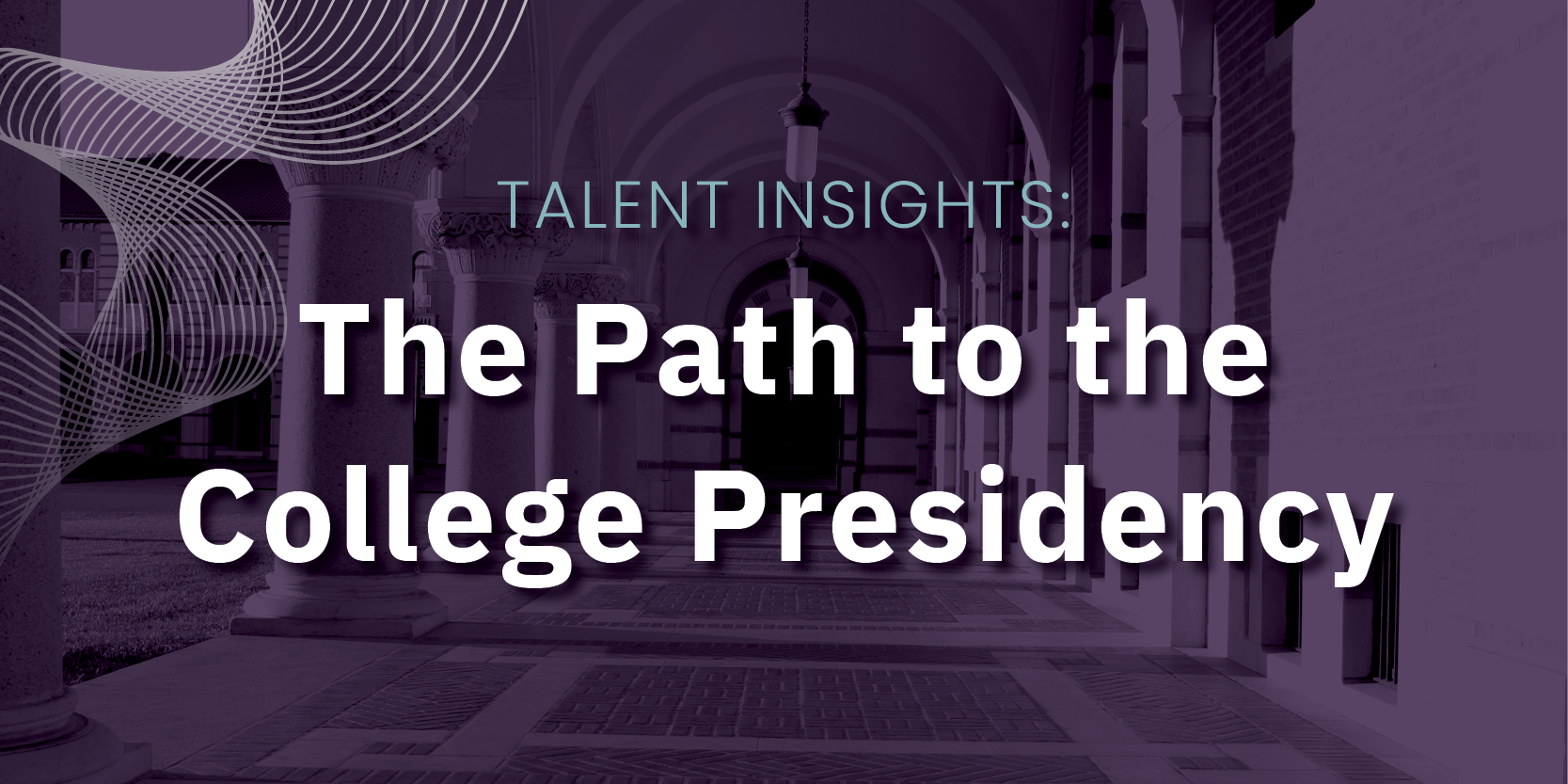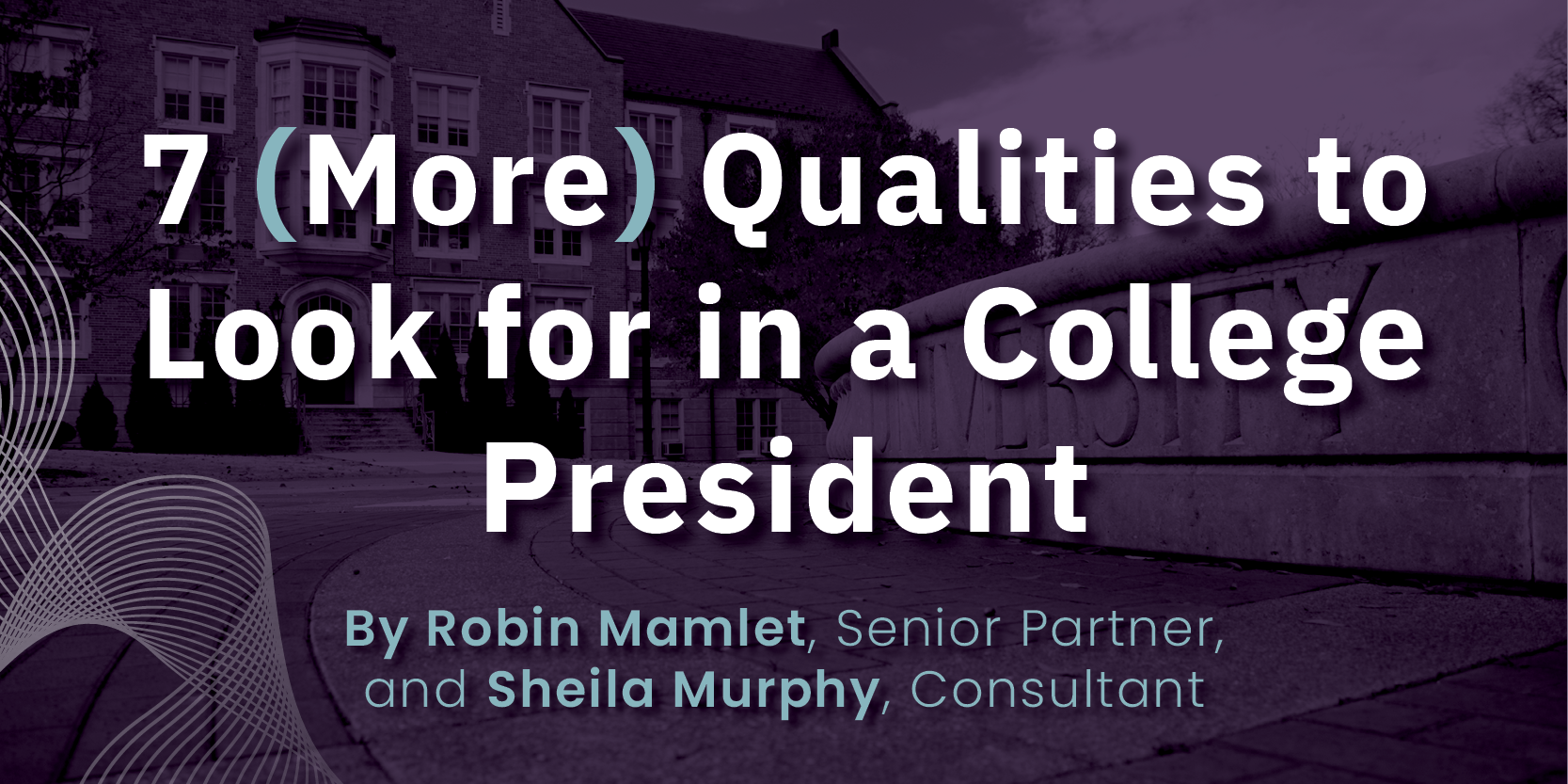The college presidency isn’t what it used to be. Presidents are under increasingly intense scrutiny for things they do and say nearly every day, and yet there are and will continue to be many great leaders who aspire to the role. Being a college president is still special, and impactful. More than ever, it is critical for each higher education institution to identify the right president for its needs, and to support this individual in the transition into their new role to increase the likelihood of immediate and long-term success.
That’s what this resource from WittKieffer is for. In the articles below, we explore some of the most challenging and compelling topics related to the presidential search and transition, and provide clear-headed, actionable advice for search committees and boards of trustees to follow. What my colleagues and I have learned over many years in recruiting and transitioning presidents is that there are many ways to find the “right” leader for a given time at a given institution. The following offerings provide essential context for institutions as they move forward in selecting and supporting their next campus leaders.
The presidency isn’t what it used to be, to be sure. But never has “getting it right” been more essential to our collective future. If we can be helpful to you as you explore these resources, I invite you to be in touch.
Zach A. Smith, Ph.D.
Executive Partner & Market Leader, Education
Contents
- Talent Insights: The Path to the College Presidency
- What Do You Really Need in Your Next President?
- 7 (More) Qualities to Look for in a College President
- The Board’s Role in a Presidential Search
- Open, Closed, or Hybrid? Thinking Through Confidentiality in Presidential Searches
- The Best Search Committees
- How Search Committees Can Benefit from Intellectual Humility
- How to Manage the First-Round Executive Interview
- Negotiating the President’s Contract
- Orchestrating a Successful Presidential Transition
Presidential Transition Guide

The long, winding career route to becoming a college president is different for everyone who rises to the position. Some exclusively traverse the academic realm, perhaps as professors then as deans or provosts. Others come from nontraditional backgrounds, sometimes from the corporate sector as they shift gears and dedicate themselves to fostering education, enriching lives, and advancing society.

A presidential transition can be a time of great excitement, anxiety, uncertainty, or all of the above. For the committee charged with finding a new leader, the tendency is to jump right in and get moving on this vitally important hire. But even when it seems crystal clear what is needed from a new leader, the smartest thing the committee can do is to take a step back before forging ahead.

Four years ago, we wrote an essay for The Chronicle of Higher Education on six essential qualities to look for in a college president. They were characteristics — such as a sense of emotional intelligence and an appetite for data and analysis — that search committees had identified time and again. As executive-search consultants with many presidential recruitments under our belts, we think those six qualities are as relevant as ever, but they are no longer enough.
At an American Council on Education meeting some years ago, a prominent university board chair noted that there are only two rules to remember when taking on the board chair role. Rule number one: running the university is not your day job. Rule number two: never forget rule number one.
The question arises in every presidential search: How public should the recruiting process be in its final stages? My honest (but potentially unsatisfying) response as an executive-search consultant for more than 15 years: It depends.
Higher-education search consultants – people like me who manage and help steward what is often the bumpy recruitment process of academic leaders – do our work in close collaboration with campus-wide search committees. Such committees are unique to academe, a byproduct of shared governance. My fellow consultants working on executive searches in other sectors like to joke, “How do you finish?”
Often during an emotionally-charged discussion, my husband or I will make a claim of some sort that isn’t, on its surface, open to debate: “It’s important for kids to participate in team sports,” one of us might say. To this the other might challenge the assumption: “But what if their talents lie elsewhere?” The clear (and tension-inducing) implication is this: Have you considered the possibility that you’re mistaken?
As a search consultant for higher education, I have introduced thousands of candidates to executive-hiring committees for the initial interview. Before COVID-19, I would often meet candidates in a hotel lobby and escort them into a room full of committee members. More frequently over the past 12 months, candidates join a screen full of unfamiliar faces via Zoom.
While negotiating compensation and terms of the employment contract for a new president can seem like a mere formality, it can also – if mishandled – be the source of unanticipated stress and delay in bringing a new leader on board. In a worst-case scenario, an institution may lose a candidate of choice due to irreconcilable differences over contract conditions.
Planful onboarding of a campus president or chancellor has received scant attention in higher education circles until recently. Robust transition support is commonplace in other industries, however, helping to plan for inevitable turnover at the top while setting the new leader up for success and ensuring their alignment with the organization’s strategic vision. Still, most CEOs, no matter how prepared, wish they had handled their transitions better. As one expert puts it, “No one is prepared to become CEO, no matter how much they think they are.”
WittKieffer is the premier executive search, interim leadership, and leadership advisory firm focused exclusively on healthcare, life sciences, and education—the quality of life ecosystem. Contact us to learn more.














